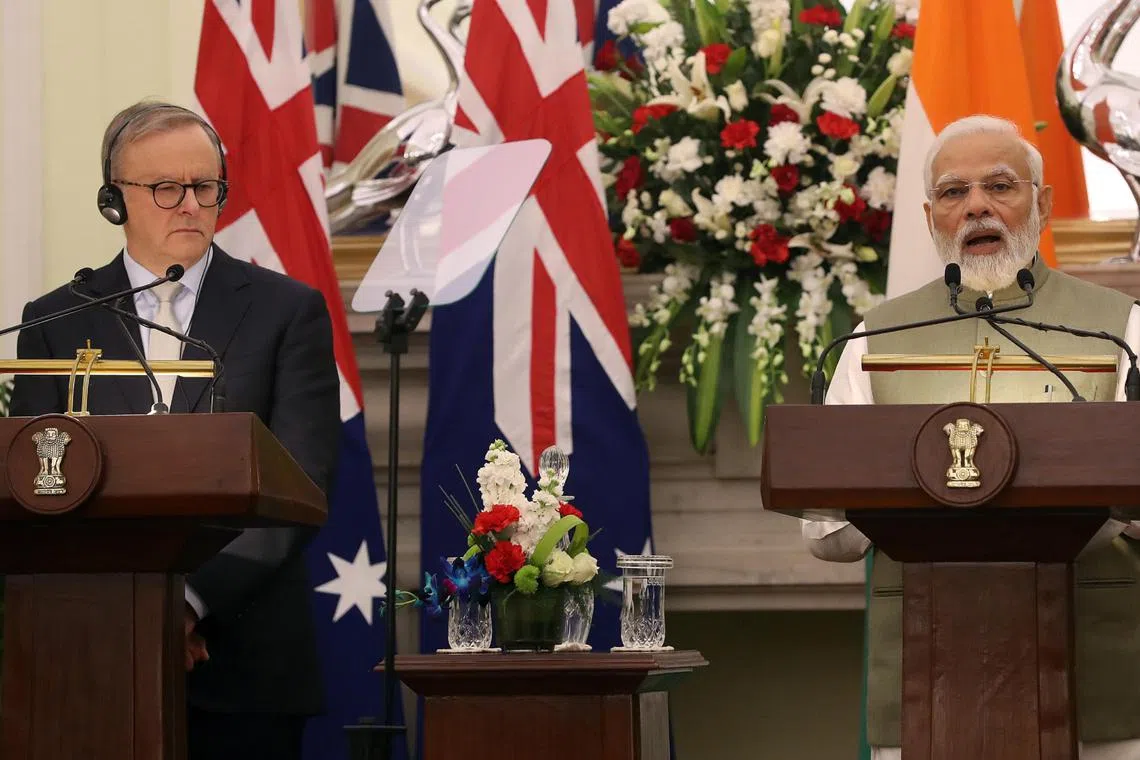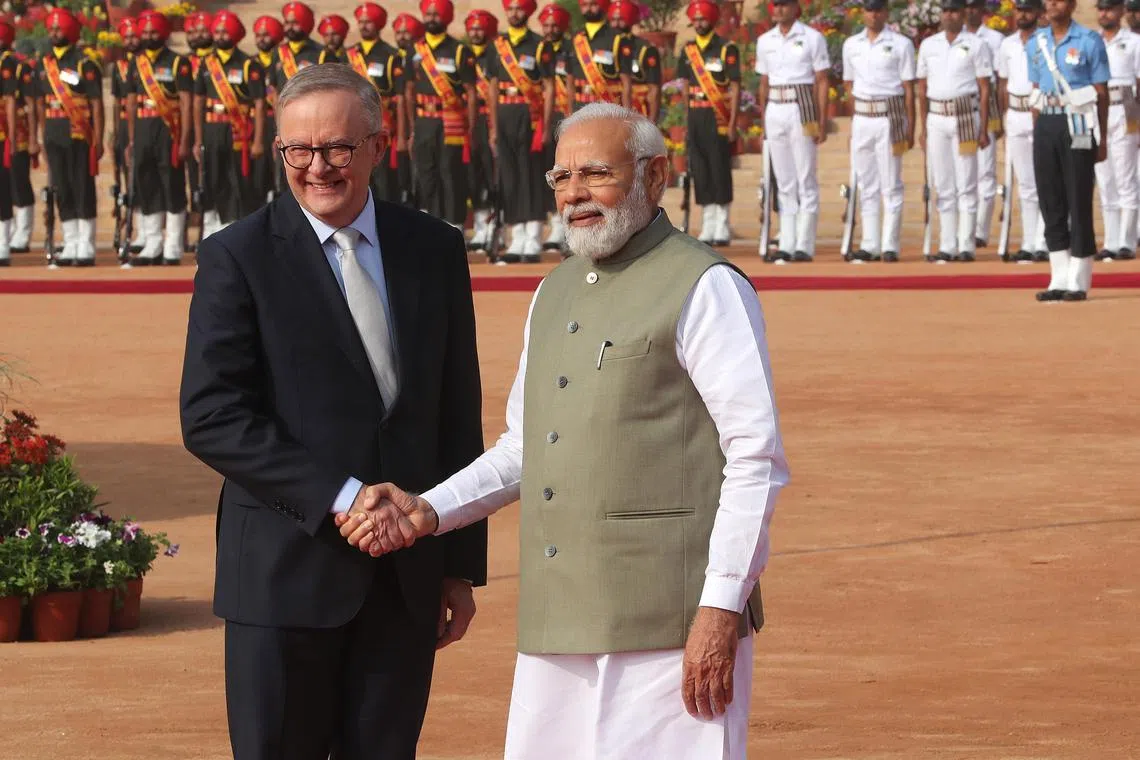India, Australia agree to deepen security and economic partnership
Sign up now: Get insights on Asia's fast-moving developments

Australian PM Anthony Albanese (left) and Indian PM Narendra Modi make a joint statement in New Delhi, on March 10, 2023.
PHOTO: EPA-EFE
NEW DELHI - Australian Prime Minister Anthony Albanese on Friday described his welcome in India as “extraordinary”, as the two countries moved to deepen economic and defence ties
India and Australia are both part of the Quad, or Quadrilateral Security Dialogue – a grouping that includes the United States and Japan – which is viewed by China as an effort to contain its rise.
In a sign of the importance given to Canberra, New Delhi rolled out the red carpet for Mr Albanese, who is on a four-day visit from Wednesday during which he travelled to three cities – Mumbai, Ahmedabad and Delhi.
Setting the tone for the visit through cricket diplomacy, Mr Albanese and Prime Minister Narendra Modi watched the opening day of a test match between Australia and India in Ahmedabad in the western state of Gujarat – the Indian leader’s home state – on Thursday.
After talks with Mr Modi, Mr Albanese on Friday said they discussed issues ranging from security to trade, including opportunities to “work closely to secure critical mineral supply chains”.
China is a dominant player in the critical minerals supply chain.
“Prime Minister Modi and I discussed the increasingly uncertain global security environment and committed to strengthening the Australia-India defence and security partnership to address shared challenges and work towards an open, stable and prosperous Indo Pacific,” said Mr Albanese, who called India “a top-tier security partner”.
The two sides also agreed to finalise a Comprehensive Economic Cooperation Agreement this year, which is expected to bolster economic ties and “employment opportunities” in both countries, said Mr Albanese.
Bilateral trade between the two countries stood at US$27.5 billion (S$37 billion) in 2021.
Mr Modi, who said that he and Mr Albanese had discussions on “maritime security in the Indo-Pacific”, also expressed concern about the safety of the Indian diaspora amid a recent spate of attacks on Hindu temples in Australia.
“PM Albanese has assured me that the safety of the Indian community is his top priority,” said Mr Modi.
The India-Australia relationship has assumed greater significance in recent years due to the shared perspective on China.
For the first time, Australia in 2023 will host the annual Malabar wargames, which are naval wargames involving the other Quad members as well.

Australian PM Anthony Albanese is welcomed by Indian PM Narendra Modi at the Presidential House in New Delhi, on March 10.
PHOTO: EPA-EFE
Analysts said the relationship between India and Australia has come into greater focus amid greater momentum in the Quad.
“I think both countries benefit from the Quad. They have reiterated the importance of rule of law, respect for international law and making sure that Asia is not a hegemonic space. So in a number of platforms – including the Quad – India and Australia reiterate the same message. And the message is to China,” said Dr Rajeswari Pillai Rajagopalan, director of the Centre for Security, Strategy & Technology, at the New Delhi-based Observer Research Foundation.
“There is a lot of momentum going on between these four strategic partners overall.”
Mr Albanese’s visit will be followed by that of Japanese Prime Minister Fumio Kishida to India from March 20 to 21. There is also the Quad leadership summit in Australia in May.
A Ministry of External Affairs press release said Japan and India will “discuss bilateral and regional issues of mutual interest”.
Nevertheless, Indian officials were keen to stress during Mr Albanese’s visit that ties between India and Australia were not dictated by a third country.
In a briefing on the talks between the two leaders, Indian Foreign Secretary Vinay Kwatra noted: “It is best we position what India and Australia do between them as a bilateral ecosystem of engagement and partnership.”
He noted that ties were not dependent on a third country.
Separately, India and the US on Thursday signed a memorandum of understanding (MOU) on semiconductors.
China and the US are engaged in a chip war as they jostle for technological supremacy.
Under the MOU, the two countries will leverage the complementary strengths of both countries and facilitate commercial opportunities and development of semiconductor innovation ecosystems, an Indian government release said.
US commerce secretary Gina Raimondo, who was in India for the US-India Commercial Dialogue during which the MOU was signed, said that as both countries were starting to implement semiconductor incentive programmes domestically, they could coordinate, for instance, to prevent “a glut of certain kinds of chips”.



